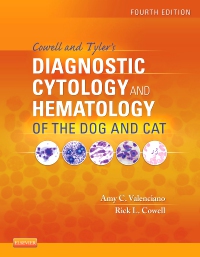
Diagnostic Cytology and Hematology of the Dog and Cat - Elsevier eBook on VitalSource, 4th Edition
Elsevier eBook on VitalSource

Highly respected in the field, Diagnostic Cytology and Hematology of the Dog and Cat is the complete resource for helping students develop the knowledge and skills they need for clinical laboratory diagnostics. Detailed illustrations and descriptions of cytologic and hematologic samples allow students to diagnose both common and uncommon diseases in dogs and cats. Microscopic evaluation techniques and interpretation guidelines for organ tissue, blood, and other body fluid specimens provide a basic understanding of sample collection and specimen preparation. In addition, algorithms are generously distributed throughout the text, helpings students evaluate various cytologic preparations.
Newer Edition Available
Diagnostic Cytology and Hematology of the Dog and Cat - Elsevier E-Book on VitalSource
-
- Over 1,300 vivid, high-resolution images help you identify normal vs. abnormal cells, enabling you to make accurate diagnoses.
- NEW! Four new chapters — The Adrenal Gland, Immunocytochemistry, Flow Cytometry, and Molecular Methods in Lymphoid Malignancies — provide you with detailed information on how these topics relate to clinical disease diagnosis.
- NEW! Revised chapters throughout the text give you the most complete and up-to-date coverage of recently recognized conditions, new terminology, and new procedures.
- Easy-to-follow algorithms and tables facilitate quick access to necessary information and guide you to the most accurate cytologic diagnosis.
- Contributions from nearly 50 academic and diagnostic laboratory experts provide the best and most current information available.
- User-friendly, detailed instructions guide you through in-house laboratory evaluation as well as the submission and transport of samples for culture and commercial laboratory interpretation.
- Comprehensive coverage in one all-inclusive resource saves you time.
- NEW! Callouts highlighting Tips and Pitfalls facilitate quick access and detailed instructions for in-house laboratory evaluation, including specimen preparation and diagnosis, as well as submission and transport of samples for commercial laboratory interpretation.
-
- NEW! Four new chapters — The Adrenal Gland, Immunocytochemistry, Flow Cytometry, and Molecular Methods in Lymphoid Malignancies — provide you with detailed information on how these topics relate to clinical disease diagnosis.
- NEW! Revised chapters throughout the text give you the most complete and up-to-date coverage of recently recognized conditions, new terminology, and new procedures.
- NEW! Callouts highlighting Tips and Pitfalls facilitate quick access and detailed instructions for in-house laboratory evaluation, including specimen preparation and diagnosis, as well as submission and transport of samples for commercial laboratory interpretation.
-
1. Sample Collection and Preparation
2. Cell Types and Criteria of Malignancy
3. Selected Infectious Agents
4. Round Cells
5. Cutaneous and Subcutaneous Lesions
6. Subcutaneous Glandular Tissue: Mammary, Salivary, Thyroid, and Parathyroid
7. Nasal Exudates and Masses
8. Oropharynx and Tonsils
9. Eyes and Associated Structures
10. External Ear Canal
11. The Lymph Nodes
12. Synovial Fluid Analysis
13. The Musculoskeletal System
14. Cerebrospinal Fluid and Central Nervous System Cytology
15. Effusions: Abdominal, Thoracic, and Pericardial
16. Transtracheal and Bronchoalveolar Washes
17. The Lung and Intrathoracic Structures
18. The Gastrointestinal Tract
19. The Pancreas
20. The Liver
21. The Spleen
22. The Kidneys
23. Examination of Urinary Sediment
24. The Male Reproductive Tract: Prostate, Testes, Penis, and Semen
25. Vaginal Cytology
26. Peripheral Blood Smears
27. The Bone Marrow
28. The Adrenal Gland
29. Immunocytochemistry
30. Flow Cytometry
31. Molecular Methods in Lymphoid Malignancies


 as described in our
as described in our 